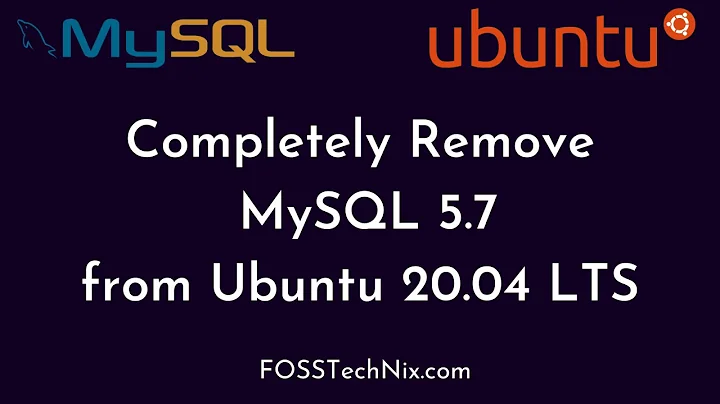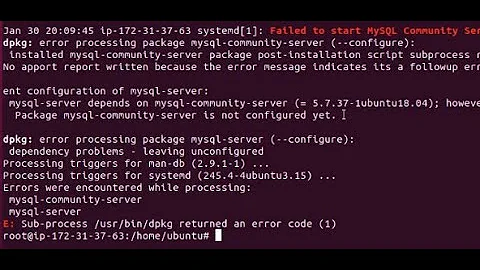How to remove MySql apt repo
Solution 1
So I added a MySql apt from the link Steps to fresh install MySql
When those are really the steps that you followed, then this is your solution.
Open a terminal and run this command if you want to remove all configurations:
sudo apt-get purge mysql-apt-config
Otherwise, this command is sufficient:
sudo apt-get remove mysql-apt-config
Solution 2
I found that /etc/apt/sources.list.d/mysql.list had all the references to mysql repositories:
pi@raspberrypi:~ $ find /etc/apt/ -type f | xargs grep "repo.mysql.com"
/etc/apt/sources.list.d/mysql.list:deb http://repo.mysql.com/apt/debian/ stretch mysql-apt-config
/etc/apt/sources.list.d/mysql.list:deb http://repo.mysql.com/apt/debian/ stretch mysql-5.7
/etc/apt/sources.list.d/mysql.list:deb http://repo.mysql.com/apt/debian/ stretch mysql-tools
/etc/apt/sources.list.d/mysql.list:#deb http://repo.mysql.com/apt/debian/ stretch mysql-tools-preview
/etc/apt/sources.list.d/mysql.list:deb-src http://repo.mysql.com/apt/debian/ stretch mysql-5.7
So I decided to remove the mysql.list i the /etc/apt/sources.list.d directory and finaly sudo apt-get update does not come with mysql repositories
Thanks every one here
Related videos on Youtube
neo.one
Updated on September 18, 2022Comments
-
 neo.one almost 2 years
neo.one almost 2 yearsI was trying to install MySql on my system running Ubuntu 14.04. So I added a MySql apt from the link Steps to fresh install MySql.
After running into a lot of trouble and realizing apt uses libs not supported by Ubuntu 14.04, I was advised to remove the apt and use Ubuntu repo to install mysql.However, it seems I can't find how to remove the above mentioned apt repo. I've been through some of the stuff I can find on the community but still no solution that worked for me! Software center shows this.
Tried using
dpkg,aptitude -removealso from software center but looks like I've hit a wall.
So any help is appreciated.-
 Admin about 9 yearshave you tried
Admin about 9 yearshave you triedsudo apt-get purge mysql*and remove /etc/apt/sources.list and dosudo apt-get updateagain. -
 Admin about 9 years@mnstalemate "remove /etc/apt/sources.list" ? Why that?
Admin about 9 years@mnstalemate "remove /etc/apt/sources.list" ? Why that? -
 Admin about 9 yearsYes, I did that, though I used 'mysql*' as the reg exp, just to be safe.
Admin about 9 yearsYes, I did that, though I used 'mysql*' as the reg exp, just to be safe. -
 Admin about 9 years@A.B so that when you update your repositories again, you won't have any manually added repos in the sources.list file.
Admin about 9 years@A.B so that when you update your repositories again, you won't have any manually added repos in the sources.list file. -
 Admin about 9 years@mnstalemate So, wouldn't that affect other manually added repos?
Admin about 9 years@mnstalemate So, wouldn't that affect other manually added repos? -
 Admin about 9 yearsYes. it will delete added repos. But you always can
Admin about 9 yearsYes. it will delete added repos. But you always cansudo apt-get updateand then manually add repos you want. This, kind of refreshes the sources.list file. -
 Admin about 9 yearsokay, tried that again, and it worked.. Thank you @mnstalemate However, some packages were still present, extremely persistent they were, used synaptic to remove those.
Admin about 9 yearsokay, tried that again, and it worked.. Thank you @mnstalemate However, some packages were still present, extremely persistent they were, used synaptic to remove those.
-
-
 neo.one about 9 yearsDone, no success.
neo.one about 9 yearsDone, no success. -
 A.B. about 9 years@neo.one The repository is still displayed in Synaptic?
A.B. about 9 years@neo.one The repository is still displayed in Synaptic? -
 neo.one about 9 yearsYes, it is displayed in Synaptic
neo.one about 9 yearsYes, it is displayed in Synaptic -
 A.B. about 9 yearsExecute this command and write the output into your question:
A.B. about 9 yearsExecute this command and write the output into your question:find /etc/apt/ -type f | xargs grep "repo.mysql.com" -
 Ruberandinda Patience almost 6 yearsI posted as new answer because of reputation sorry
Ruberandinda Patience almost 6 yearsI posted as new answer because of reputation sorry -
 terdon almost 6 yearsWhy is this not an answer? The last line is what the OP did to solve the issue.
terdon almost 6 yearsWhy is this not an answer? The last line is what the OP did to solve the issue.






